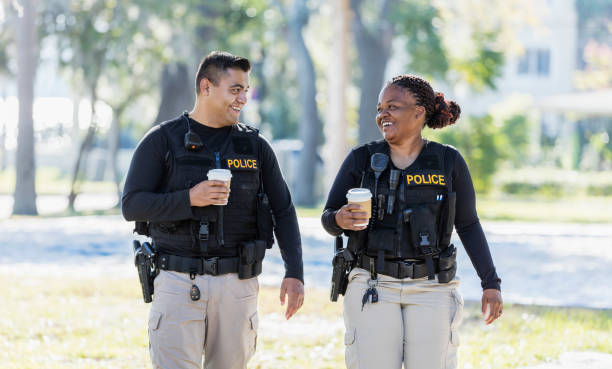Building Trust Through Feedback: The Role of Officer Survey in Community Policing
As law enforcement leaders, our ultimate goal is to serve and protect our communities. To achieve this goal, we must engage with our citizens and build strong relationships based on trust and respect. But how do we measure the level of service we provide and how do we improve it? This is where Officer Survey comes in.
Officer Survey is a powerful tool that enables law enforcement agencies to gather feedback from citizens, officers, and community leaders. It allows citizens to rate the level of service they received from an officer, enables police leaders to conduct internal surveys including mental health survey, employee engagement surveys and more, and empowers city leaders to conduct community engagement surveys. In this blog, we will explore the benefits of Officer Survey and strategies for effective community engagement.
Benefit #1: Officer Survey allows citizens to rate the level of service they received from the officer
One of the key benefits of Officer Survey is that it enables citizens to provide feedback on the level of service they received from an officer. This feedback is essential in helping law enforcement agencies improve the quality of service they provide. Officer Survey provides citizens with a quick and easy way to provide feedback on their interaction with an officer. This feedback can help identify areas for improvement and enable law enforcement agencies to make necessary changes.
Benefit #2: Officer Survey enables police leaders to conduct internal surveys including mental health survey, employee engagement surveys and more
Officer Survey is not just a tool for gathering feedback from citizens. It also enables police leaders to conduct internal surveys to gather feedback from their officers. This can include mental health surveys, employee engagement surveys, and more. These surveys can provide valuable insights into the health and well-being of officers, as well as their level of engagement with the community.
Benefit #3: Officer Survey empowers city leaders to conduct community engagement surveys
In addition to gathering feedback from citizens and officers, Officer Survey also enables city leaders to conduct community engagement surveys. These surveys can help city leaders better understand the needs and concerns of their communities, and develop strategies to address them. By engaging with the community in this way, law enforcement agencies can build stronger relationships based on trust and mutual respect.
Benefit #4: Officer Survey flags officers that received low ratings and alerts supervisors
Another key benefit of Officer Survey is that it flags officers that received low ratings and alerts supervisors. This enables law enforcement agencies to take corrective action and ensure that officers are providing the best possible service to citizens. By identifying areas for improvement and addressing them promptly, law enforcement agencies can improve the overall quality of service they provide.
Benefit #5: Officer Survey offers a citizen callback feature allowing police leaders to address citizen issues immediately
Finally, Officer Survey offers a citizen callback feature that allows police leaders to address citizen issues immediately. When a citizen provides feedback through Officer Survey, their contact information is collected. This enables law enforcement agencies to follow up with citizens and address their concerns promptly. By addressing citizen issues in a timely manner, law enforcement agencies can build trust and improve the relationship between officers and the community they serve.
Strategies for Effective Community Policing Engagement
Now that we have explored the benefits of Officer Survey let’s take a look at some strategies for effective community engagement.
Strategy #1: Listen to the Community
Effective community engagement starts with listening to the community. By actively seeking out feedback from citizens, law enforcement agencies can better understand their needs and concerns. This can help identify areas for improvement and develop strategies to address them. By listening to the community, law enforcement agencies can build trust and improve the relationship between officers and the community they serve.
Strategy #2: Engage with the Community
In addition to listening to the community, it is also important to actively engage with them. This can include attending community events, hosting town hall meetings, and participating in community outreach programs. By actively engaging with the community, law enforcement agencies can build stronger relationships based on trust and respect. This can help improve public safety by encouraging citizens to work with law enforcement agencies to address community concerns.
Strategy #3: Use Technology to Enhance Community Engagement
In today’s digital age, technology can be a powerful tool for enhancing community engagement. Officer Survey is just one example of how technology can be used to gather feedback from citizens and improve the quality of service provided by law enforcement agencies. Other examples include social media platforms, mobile applications, and online forums. By using technology to enhance community engagement, law enforcement agencies can reach a wider audience and gather feedback in real-time.
Strategy #4: Develop Partnerships with Community Leaders
Finally, it is important to develop partnerships with community leaders to build trust and improve the relationship between law enforcement agencies and the communities they serve. This can include working with community organizations, faith-based groups, and local businesses. By developing these partnerships, law enforcement agencies can gain a better understanding of the needs and concerns of the community and develop strategies to address them.
Conclusion
In conclusion, Officer Survey is a powerful tool that can help law enforcement agencies build stronger communities through effective community engagement. By gathering feedback from citizens, officers, and community leaders, law enforcement agencies can identify areas for improvement and develop strategies to address them. By actively listening to and engaging with the community, using technology to enhance community engagement, and developing partnerships with community leaders, law enforcement agencies can improve public safety and build trust with the communities they serve. It is our duty as law enforcement leaders to ensure that we are providing the best possible service to our communities, and Officer Survey is just one tool that can help us achieve this goal.






